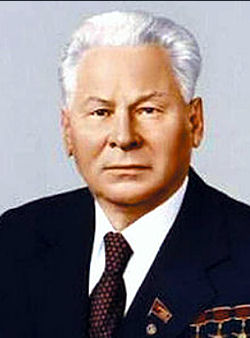Chernenko - Final Days
 Chernenko's ascent to power left the reins of the USSR in the hands of another seriously ill man. Chernenko had long suffered from emphysema, complicated by pulmonary cardiac insufficiency, as well as from chronic hepatitis. His weak condition was clearly visible during his televised acceptance speech. The poor state of Chernenko's health made the question of succession an acute one. According to the memoirs of his secretary O.A.Zakharov, K.U. Chernenko felt bad already at the first meeting of the Politburo, when the question of the secretary general was being decided, barely managed to get to the sofa in the rest room.
Chernenko's ascent to power left the reins of the USSR in the hands of another seriously ill man. Chernenko had long suffered from emphysema, complicated by pulmonary cardiac insufficiency, as well as from chronic hepatitis. His weak condition was clearly visible during his televised acceptance speech. The poor state of Chernenko's health made the question of succession an acute one. According to the memoirs of his secretary O.A.Zakharov, K.U. Chernenko felt bad already at the first meeting of the Politburo, when the question of the secretary general was being decided, barely managed to get to the sofa in the rest room.
He spent most of his reign in the hospital, where even Politburo meetings were held. He died under strange circumstances. In August 1983, Chernenko was seriously poisoned by the smoked fish sent to him by the Minister of the Interior of the USSR Vitaly Fedorchuk. The doctors managed to save him, but it was impossible to restore health and efficiency to the initial level. Afterwards, Chernenko practically lived in the Central Clinical Hospital.
By May 1984, Chernenko's leadership position may well have been significantly impacted by his declining health. Chernenko's physical deterioration and lack of stamina could well have accelerated the accumulation of power by ounger Politburo members, namely Mikhail Gorbachev. Since resuming public appearances in September 1984, Chernenko projected an image of activism in foreign and domestic affairs and undercut the party's number two man, Mikhail Gorbachev. Chernenko's initial public appearances in September had all the earmarks of carefully staged efforts to demonstrate he was back on the job without exposing him to lengthy scrutiny or taxing his stamina. By month's end, however, he apparently had acquired sufficient physical strength to launch a campaign to regain the political initiative and strengthen his authority.
In light of Chernenko's chronic ill health, his resurgence was only temporary. Still, he displayed a physical and political vigor that may enable him to be more than the figurehead his detractors had claimed and required his rivals to maneuver adroitly to protect their positions. The decision not to hold a Central Committee plenum prior to the Supreme Soviet session in late November may have reflected an effort to avoid leadership conflict for the time being over key personnel issues.
Since the end of 1984, because of a serious illness, he rarely came to work, he spent no more than two or three hours in his office in the office days. Suffered from pulmonary and cardiac insufficiency, chronic hepatitis of the liver, pneumonia, he was choking. He was brought to work in a hospital wheelchair. The way from the office to the elevator he overcame with a rest: "Here, I'm tired. You drag me into all sorts of events. We must somehow cut them. " He spoke with difficulty.
Chernenko's health eroded throughout the early months of 1985. From 07 February 1985 until the end of his days he was in the hospital. In the Central Clinical Hospital, several days before his death, he was given a certificate of election as a people's deputy of the RSFSR. On March 10, 1985 at 7:20 pm Chernenko died of cardiac arrest, with manifestations of hepatic and pulmonary-cardiac insufficiency. Chernenko lived only 13 months in post. After death, a personal safe was opened, which was filled with bundles of money. The drawers of the desk were also filled with them.
Konstantin Ustinovich was poisoned with a slowly acting poison. [Russian Germany. 2005. #10. March 14-20]. One can only speculate, but the version of willful poisoning of the future secretary general is quite likely. After all, the fish was presented already when it was clear who would replace the seriously ill Andropov. The fact is that his colleagues in the Politburo of the CPSU Central Committee could not fail to understand what would happen if the country returned to Stalinism. Each of them somehow betrayed Stalin and participated in the subsequent massacre of his closest associates. Therefore, they quite naturally feared revenge on the part of the descendants of these people in the event that Chernenko returned the Stalin regime.
|
NEWSLETTER
|
| Join the GlobalSecurity.org mailing list |
|
|
|

